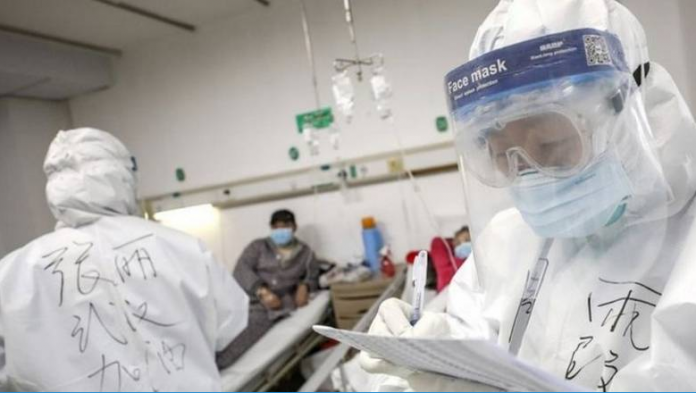More than 2,207,730 declared cases have been registered in 193 countries since the epidemic first emerged in China in December.
The worldwide death toll from the novel coronavirus pandemic rose to 150,142 on Friday, according to a tally from official sources compiled by AFP at 1900 GMT (11pm UAE).
More than 2,207,730 declared cases have been registered in 193 countries and territories since the epidemic first emerged in China in December.
Of these cases, at least 483,000 are now considered to have recovered.
The tallies, using data collected by AFP from national authorities and information from the World Health Organization (WHO), probably reflect only a fraction of the actual number of infections.
Many countries are testing only the most serious cases.
In the United States, now the epicentre of the pandemic, the death toll stood at 34,575 with 683,786 infections. At least 56,546 patients have recovered.
Italy is the next most-affected country with 22,745 deaths and 172,434 confirmed infections.
It is followed by Spain with 19,478 fatalities and 188,068 confirmed infections, France with 18,681 deaths and 147,969 infections and Britain with 14,576 deaths and 108,692 cases.
China — excluding Hong Kong and Macau — has to date declared 4,632 deaths and 82,367 cases.
Europe has listed 1,100,677 cases and 96,721 deaths to date; the US and Canada together have 715,428 cases with 35,929 deaths; Asia 157,131 cases with 6,801 deaths; the Middle East 117,953 cases with 5,371 deaths; Latin America and the Caribbean 89,460 cases with 4,242 deaths; Africa 19,296 cases with 995 deaths; and Oceania 7,785 cases with 83 deaths.
The World Bank Group (WBG) is expected to launch health emergency programs in over 100 countries by the end of April to support the fight against COVID-19, with 64 already in operation, President David Malpass said Friday.
The WBG will work to deploy as much as $160 billion over the next 15 months, tailored to the nature of the health, economic and social shocks that countries are facing during the pandemic, Malpass told a virtual press conference during the Spring Meetings of the International Monetary Fund (IMF) and the WBG.
Other multilateral development banks (MDBs), such as Asian Development Bank, and Inter-American Development Bank, have committed as a group to roughly $80 billion over this period, bringing the total funding from MDBs to 240 billion dollars, Malpass said.
The World Bank president said he is pleased that Group of Twenty (G20) countries have recently decided to provide a suspension in debt service to bilateral creditors during the crisis, calling it “a powerful fast-acting initiative that can bring real benefits to the poor.”
Noting that China is one of the big creditors, Malpass said China’s support in the international agreement to allow a moratorium of debt repayments for the poorest countries is “important” and was “very welcome.”
In response to a question from Xinhua regarding protectionism amid the pandemic, Malpass said big countries need to step forward and pledge not to use the crisis as a reason to close or block the markets.
“We should allow markets to function, markets to clear and the supplies to go to those most in need,” said the World Bank president, adding that China is exporting medical supplies to the rest of the world, which is “very welcome.”
Shortly before the briefing, a meeting of the Development Committee, the joint ministerial committee of the boards of governors of the WBG and the IMF, also urged countries to keep trade open.
The committee “ask that all countries ensure the flow of vital medical supplies, critical agricultural products, and other goods and services across borders, and that they work to resolve disruptions to the global supply chains, to support the recovery,” it said in a statement.
The committee also urged the two institutions to work with countries to design and implement policies and programs that help lift the poorest households out of poverty and support small businesses.
The policy-setting body of the IMF on Thursday also pledged collective action to mitigate the health and economic impact of Covid-19.
“The fund has revamped the fund’s toolkit by doubling access levels to emergency facilities, expanding the use of precautionary lines, establishing a new short-term liquidity line, and considering other options to help countries meet their financing needs,” Lesetja Kganyago, International Monetary and Financial Committee chairman, told a news conference on Thursday.
The move came after G20 finance ministers and central bankers on Wednesday agreed to “support a time-bound suspension of debt service payments for the poorest countries that request forbearance” following a teleconference meeting
“Just seeing how the G20 united around debt standstill for the poorest members gives me that confidence that whatever is necessary, we will collectively do in the face of this tremendous crisis,” IMF Managing Director Kristalina Georgieva said Wednesday.




